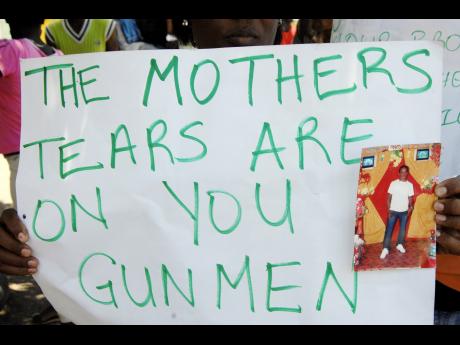Residents of violence-ravaged community determined to ensure change
Residents of Rose Town in South St Andrew are confident that the heavy cloud of violence that has hovered over the community in the past is slowly blowing away, even though sporadic shootings continue to stymie efforts towards a lasting peace.
"The future of Rose Town is very bright. I know that. But you still have some people who don't believe," said Patricia Sandford, past president of the Rose Town Benevolent Society.
"Over the years, the residents hear that things are going to happen, and then it never happens, so you have people who believe nothing will change. And that is the mindset that we are working with.
"No matter what we do, you will always find some negative people. If they don't see money, they say nothing not going on," added Sandford, who now manages the Michael Black Resource Centre on Tobias Street in the community.
Sandford pointed to recent shootings in Rose Town and the neighbouring Maxfield Avenue area that left nine persons, including a four-year-old, with gunshot wounds.
According to reports, on June 9, gunmen corralled a group of persons on St James Street in the community and opened fire, hitting six of them.
Two hours later, a group of men ambushed persons at an ice-cream shop along Maxfield Avenue and opened fire, hitting three, including the four-year-old child, who was shot in the arm.
It does not appear that the two shooting incidents were related, but residents are taking no chances. Sandford shared that some parents have started to prevent their children from attending the youth club meetings in the area.
"Nobody is sure what is going on. It is not as if there was a flare-up of violence in the community," said Sandford as she added that prior to those incidents, there were two other shootings in neighbouring communities earlier this year. One man was killed in one of the incidents.
"We have found that since those two shootings last month, persons are very hesitant to come out. Parents are not sending out their children because they are afraid. It is really affecting us," said Sandford as she noted that attendance at meetings of the police youth club had dwindled to less than half of its 50 members.
Samantha Walters, current president of the Rose Town Benevolent Society, told our news team that over the past three weeks, fewer than 11 persons have turned out for meetings.
"The police youth club was set up to prevent teenage pregnancies and youths falling into crime, and when persons can't come out because of the same crime problems, sooner or later they are going to lose interest and go into the same things we are trying to prevent," said Walters.
War over turf
Some residents claim that the flare-up in violence stems from a war over turf and a push for leadership after police arrested an area leader from the community.
Calvin Gibbs, a resident and one of the founders of the Rose Town Community Library, said that despite the fragile peace in the area since the end of the clashes between persons aligned to the governing People's National Party (PNP) and those aligned to the Jamaica Labour Party (JLP), there needs to be a change of mindset among the unemployed youth.
He is hoping that the library will spark that change among the children, the community's future.
"One side sees themselves as PNP and the other see themselves a JLP. But over the years, we realise that it don't really make sense. So we just come together, the top and the bottom, and from that, is just one Rose Town," said Gibbs.
"But we find that we have different challenges because plenty of the youths are not working and are uneducated. They have no skills. That's why we are trying to put some things in place like the library to change the mindset of the youths," added Gibbs.
Rose Town is one of 18 inner-city communities set to benefit from the implementation of the Government's $4.8 billion Integrated Community Development Project (ICDP), which targets social transformation.
The initiative aims to elevate beneficiaries' educational outcomes, as well as improve sanitary conveniences and security, among other outcomes, and is being implemented by the Jamaica Social Investment Fund.
The World Bank-funded project aims to promote public safety and transformation through the delivery of basic infrastructure and social services.
Speaking at the launch in March, Member of Parliament for the area Dr Omar Davies said based on the positive results of previous social interventions, he believes the community will benefit significantly from the ICDP's provisions.




